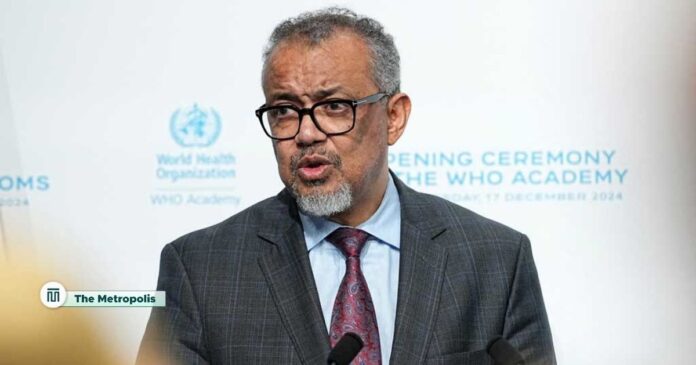During a round of attacks on the Iran-aligned Houthi movement, Israel launched an airstrike on Yemen’s main airport a day earlier, and the head of the World Health Organization said Friday he was unsure if he would survive.
WHO Director-General Tedros Adhanom Ghebreyesus said that the explosions that shook the building were so loud that his ears were still ringing over a day after his ordeal at the Sanaa International Airport on Thursday.
Tedros claimed that after about four explosions, one of which occurred “alarmingly” close to where he was sitting near the departure lounge, it soon became clear that the airport was being attacked, and he described people “running in disarray” through the area.
“I was not sure actually I could survive because it was so close, a few meters from where we were,” he stated to Reuters. “A slight deviation could have resulted in a direct hit.”
Tedros claimed that for the next hour or so, he and his coworkers were stranded at the airport while what he believed to be drones flew overhead, raising fears that they might reopen fire. He and his colleagues saw missile fragments among the debris, he said.
“There was absolutely no shelter. Nothing. You’re just waiting for anything to happen, so you’re exposed,” he said.
After the Houthis repeatedly launched drones and missiles toward Israel in what they claim were gestures of solidarity with Palestinians in Gaza, Israel launched its strikes on Yemen.
Benjamin Netanyahu, the prime minister of Israel, later stated that Israel was “just getting started” with the Houthis.
According to the Houthi-run Saba News Agency, 40 people were injured in the attacks, and three people were killed in Hodeidah and three in the airport.
Speaking over the phone from Jordan, where he assisted in transporting a U.N. colleague who was critically hurt at the airport for additional medical care on Friday, Tedros claimed he had not been informed that Israel might launch an attack on the airport.
He reported that the injured man, who worked for the UN Humanitarian Air Service, was now “OK” and in a stable condition.
In an attempt to negotiate the release of U.N. employees and other people detained in Yemen, Tedros traveled there over Christmas. Given the high level of tension between Israel and the Houthis, he admitted that he and his colleagues were aware that the trip was dangerous.
“But they felt they had to advantage of the window of opportunity to work for the release of the UN personnel,” Tedros, a former Ethiopian foreign minister, said.
He reported that negotiations with Yemeni authorities had proceeded smoothly and that he believed there was a possibility of the release of the 16 UN employees, diplomatic mission staff, and nongovernmental organization workers detained there.
He said his itinerary had been made public and expressed surprise that civilian infrastructure should have been targeted, but he declined to engage in recriminations over the attack.
He stated, “So a civilian airport should be protected, whether I am in it or not,” before pointing out that his experiences in Yemen were “nothing special.” According to one of my coworkers, we came very close to dying. I’m only a single person. I therefore sympathize with people who deal with the same issue every day. However, at least it made it possible for me to experience their emotions.
Tedros went on to say, “I’m worried about our world, where it’s heading,” and he urged world leaders to cooperate in order to put an end to international conflicts. “I have never, as far as I can remember, seen the world really being in such a very dangerous state.”



